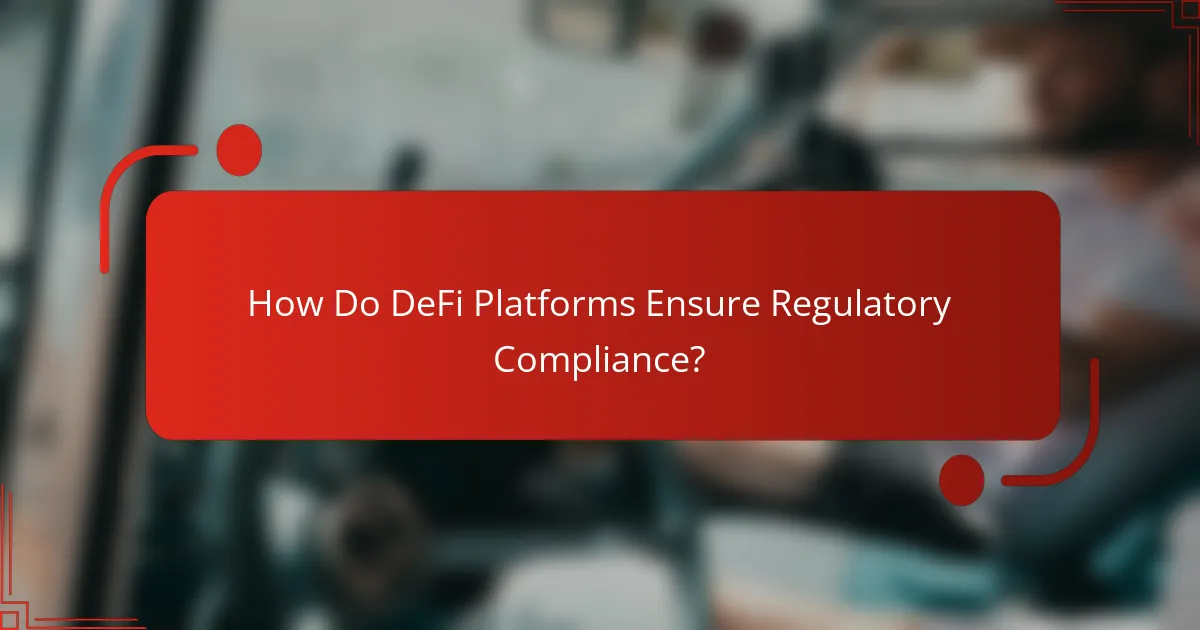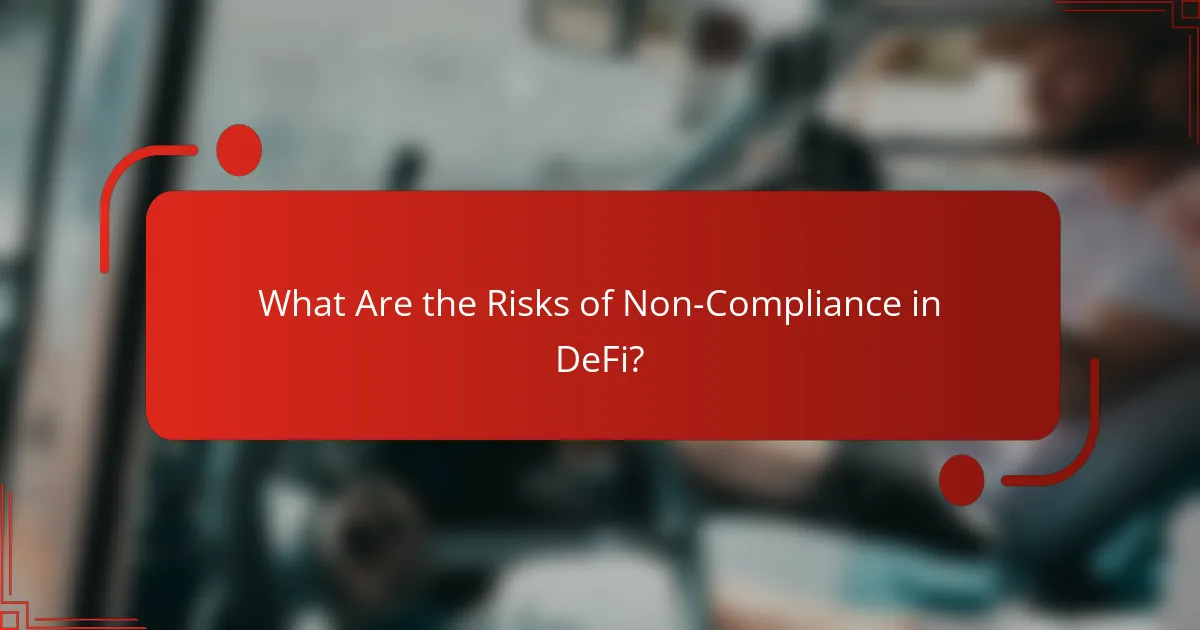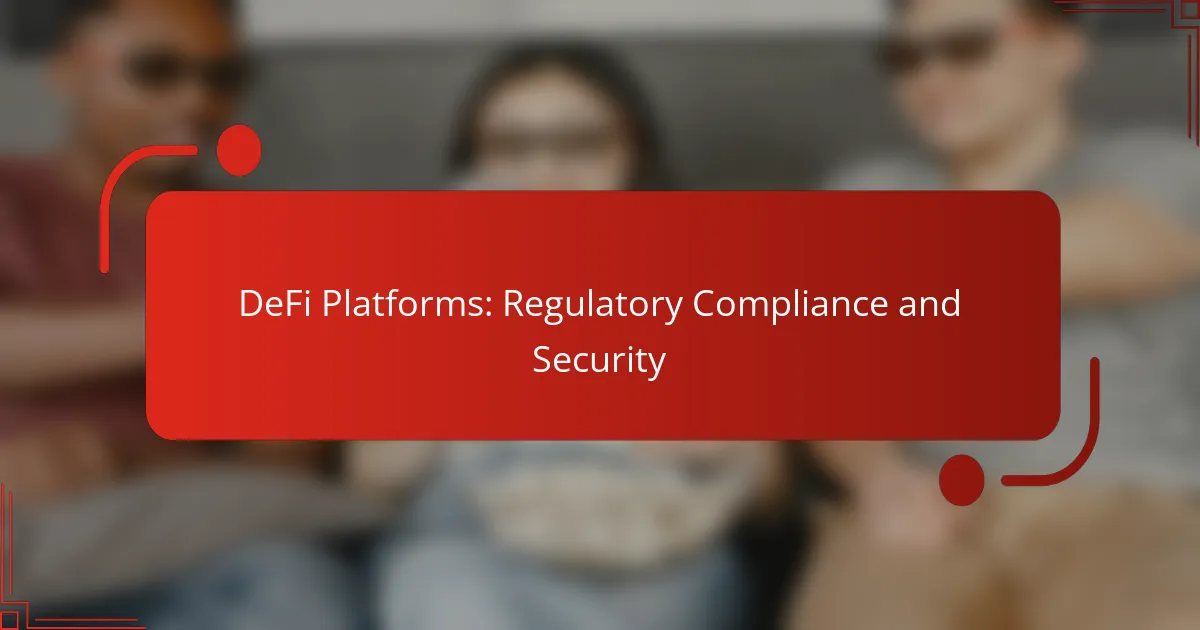Decentralized finance (DeFi) platforms are increasingly focusing on regulatory compliance to enhance user trust and mitigate risks associated with fraud and illicit activities. By implementing Know Your Customer (KYC) procedures and Anti-Money Laundering (AML) policies, these platforms aim to navigate the complex landscape of legal requirements while ensuring the security of user funds through measures like smart contract audits and multi-signature wallets.

How Do DeFi Platforms Ensure Regulatory Compliance?
DeFi platforms ensure regulatory compliance through a combination of Know Your Customer (KYC) procedures, Anti-Money Laundering (AML) policies, licensing requirements, reporting obligations, and geographic compliance variations. These measures help mitigate risks associated with fraud and illicit activities while fostering trust among users.
Know Your Customer (KYC) Procedures
KYC procedures are essential for DeFi platforms to verify the identities of their users. By collecting personal information such as names, addresses, and identification documents, platforms can reduce the risk of fraud and ensure compliance with regulations. Many platforms implement automated verification systems to streamline this process.
It’s crucial for users to provide accurate information during KYC checks, as discrepancies can lead to account freezes or bans. Additionally, platforms may require periodic updates to KYC data to maintain compliance.
Anti-Money Laundering (AML) Policies
AML policies are designed to prevent financial crimes, including money laundering and terrorist financing. DeFi platforms typically implement transaction monitoring systems to identify suspicious activities and flag them for further investigation. This helps platforms comply with legal obligations and protect their reputation.
Users should be aware that platforms may impose limits on transactions or require additional documentation if unusual patterns are detected. Understanding these policies can help users navigate potential restrictions.
Licensing Requirements
Licensing requirements vary by jurisdiction and can significantly impact how DeFi platforms operate. Some regions mandate that platforms obtain licenses to offer financial services, while others may have more lenient regulations. Compliance with these requirements is crucial for legal operation and can influence user trust.
Platforms should clearly communicate their licensing status to users, as this transparency can enhance credibility. Users should verify whether a platform is licensed in their jurisdiction before engaging in transactions.
Reporting Obligations
DeFi platforms often have reporting obligations to regulatory authorities, which may include submitting transaction data and user information. These requirements help authorities monitor compliance and detect illicit activities. Platforms must have robust systems in place to manage and report this data accurately.
Users should be aware that their transaction history may be subject to scrutiny and that platforms may be required to disclose information in response to regulatory inquiries.
Geographic Compliance Variations
Geographic compliance variations refer to the differing regulations that apply to DeFi platforms based on their operational locations. Some countries have stringent regulations, while others may lack clear guidelines. This inconsistency can affect how platforms implement KYC, AML, and licensing practices.
Users should research the regulatory environment in their country and the countries where their chosen platforms operate. Understanding these variations can help users make informed decisions about which platforms to trust and use.

What Security Measures Are Essential for DeFi Platforms?
Essential security measures for DeFi platforms include smart contract audits, multi-signature wallets, decentralized insurance solutions, and regular security assessments. These practices help protect user funds and maintain trust within the decentralized finance ecosystem.
Smart Contract Audits
Smart contract audits are critical for identifying vulnerabilities in the code that could be exploited. Engaging reputable third-party firms to conduct these audits ensures that the contracts are secure before deployment. Regular audits, especially after updates, help maintain ongoing security.
Consider using standardized frameworks and tools during audits to streamline the process. For example, tools like MythX or Slither can assist in identifying common issues. Aim for audits from firms with a strong track record in the DeFi space.
Multi-Signature Wallets
Multi-signature wallets require multiple private keys to authorize transactions, significantly enhancing security. This setup prevents a single point of failure, as funds cannot be accessed without the consensus of multiple parties. It is advisable to set a threshold that balances security and convenience.
For instance, a 2-of-3 multi-signature wallet means that at least two out of three designated signers must approve a transaction. This approach is particularly useful for managing funds in a decentralized organization or treasury.
Decentralized Insurance Solutions
Decentralized insurance solutions provide coverage against smart contract failures and hacks, offering an additional layer of security for users. Platforms like Nexus Mutual allow users to pool funds and share risks, providing payouts in the event of a loss.
When considering insurance, evaluate the terms and coverage limits carefully. Look for policies that cover a wide range of risks and ensure that the insurance provider has a solid reputation in the DeFi community.
Regular Security Assessments
Regular security assessments are essential for identifying new vulnerabilities as the DeFi landscape evolves. These assessments should include penetration testing and vulnerability scanning to uncover potential weaknesses in the platform’s infrastructure.
Establish a routine schedule for these assessments, ideally quarterly or bi-annually, to stay ahead of emerging threats. Additionally, consider engaging with the community for bug bounty programs to incentivize external security researchers to identify issues.

What Are the Risks of Non-Compliance in DeFi?
Non-compliance in decentralized finance (DeFi) can lead to severe repercussions, including legal penalties, loss of user trust, and increased scrutiny from regulators. These risks can undermine the operational integrity and long-term viability of DeFi platforms.
Legal Penalties
DeFi platforms that fail to comply with applicable regulations may face significant legal penalties. These can include hefty fines, sanctions, or even criminal charges against the individuals involved. For instance, platforms operating without proper licensing may be subject to enforcement actions from financial authorities.
In some jurisdictions, non-compliance can result in the freezing of assets or the shutdown of operations. It is crucial for DeFi projects to stay informed about local regulations to avoid these costly legal repercussions.
Loss of User Trust
User trust is paramount in the DeFi space, and non-compliance can severely damage this trust. If users perceive a platform as risky or unreliable due to regulatory issues, they are likely to withdraw their funds and seek alternatives. This can lead to a significant decline in user base and liquidity.
To maintain user confidence, DeFi platforms should prioritize transparency and communicate their compliance efforts clearly. Regular audits and compliance reports can help reassure users about the platform’s commitment to regulatory standards.
Increased Regulatory Scrutiny
Non-compliance can attract increased scrutiny from regulators, leading to more frequent audits and investigations. This heightened attention can strain resources and distract from the platform’s core operations. Additionally, ongoing scrutiny may result in stricter regulations being imposed on the entire sector.
To mitigate this risk, DeFi platforms should proactively engage with regulators and participate in industry discussions. Building a reputation for compliance can help reduce the likelihood of adverse regulatory actions and foster a more favorable operating environment.

How Can Users Assess DeFi Platform Security?
Users can assess DeFi platform security by reviewing audit reports, checking community feedback, and evaluating security features. These steps help identify potential risks and ensure that the platform has taken necessary precautions to protect user assets.
Review Audit Reports
Audit reports provide a detailed analysis of a DeFi platform’s code and security practices. Look for reports from reputable firms that specialize in blockchain security, as they often highlight vulnerabilities and confirm compliance with industry standards.
When reviewing an audit report, pay attention to the findings and whether the platform has addressed any identified issues. A platform that undergoes regular audits demonstrates a commitment to security and transparency.
Check Community Feedback
Community feedback is a valuable resource for assessing the reputation and reliability of a DeFi platform. Explore forums, social media, and dedicated cryptocurrency communities to gauge user experiences and concerns.
Look for patterns in feedback; consistent complaints about security breaches or poor customer service may indicate underlying issues. Engaging with the community can also provide insights into the platform’s responsiveness to security concerns.
Evaluate Security Features
Security features such as multi-signature wallets, insurance funds, and robust authentication methods are essential for protecting assets on DeFi platforms. Ensure that the platform employs these features to mitigate risks associated with hacks and fraud.
Check if the platform has a clear incident response plan and how they handle security breaches. A platform that prioritizes security will have transparent policies and proactive measures in place to safeguard user funds.

What Are the Best Practices for DeFi Regulatory Compliance?
Best practices for DeFi regulatory compliance include implementing strong governance frameworks, adhering to Know Your Customer (KYC) and Anti-Money Laundering (AML) regulations, and ensuring transparency in operations. These measures help mitigate risks and build trust with users and regulators alike.
Implement Robust KYC/AML Procedures
Implementing robust KYC and AML procedures is crucial for DeFi platforms to prevent illicit activities and comply with regulations. This involves verifying the identities of users and monitoring transactions for suspicious behavior. Effective KYC processes can reduce the risk of fraud and enhance the platform’s reputation.
Platforms should adopt a tiered approach to KYC, where users undergo varying levels of verification based on their transaction volumes and risk profiles. For instance, low-volume users might only need basic identity verification, while high-volume users may require more extensive documentation. This approach balances user experience with compliance needs.
Common pitfalls include inadequate user verification and failure to monitor transactions effectively. To avoid these, platforms should regularly update their KYC/AML policies and invest in technology that automates compliance checks. Regular audits can also help ensure that procedures remain effective and aligned with evolving regulations.
